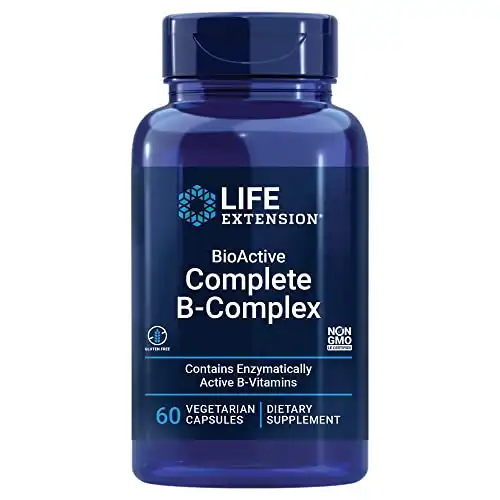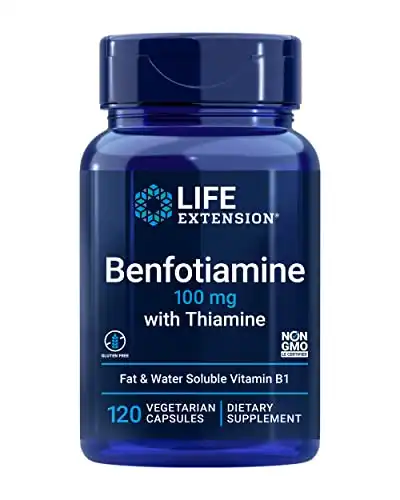Why Do You Need B Vitamins?
B vitamins are a group of nutrients that play an essential role in maintaining optimal health and well-being.
These water-soluble vitamins are crucial for a wide range of physiological processes, including energy production, DNA synthesis, and the proper functioning of the nervous system.
Unlike fat-soluble vitamins, B vitamins are not stored in the body in significant amounts, making it important to consume them regularly through diet or supplements to prevent deficiencies.
Despite the availability of B vitamins in a range of foods such as lean meats, whole grains, legumes, nuts, and leafy greens, some people may be at risk for B vitamin deficiencies due to factors like poor diet, poor gut health affecting absorption, certain medical conditions, or increased physiological needs.
Table Of Contents
Key Functions of B Vitamins
B vitamins play crucial roles in numerous physiological processes, influencing everything from energy production to cognitive health.
These vitamins are essential for the body’s optimal functioning.
Energy Production and Metabolism

B vitamins are integral to energy production and metabolism. They help convert the energy from carbohydrates, fats, and proteins in our diet into ATP, the molecule that powers cellular activities.
For instance, Thiamin (B1) aids in the metabolic process of producing energy, while Riboflavin (B2) plays a key role in the electron transport chain, a critical part of ATP production.
Additionally, Pantothenic Acid (B5) is involved in synthesizing fatty acids.
These combined actions ensure our cells have the energy they need to function effectively.
Cognitive and Psychological Function

Our brain relies heavily on B vitamins for proper function. Vitamins like B6 (Pyridoxine), B9 (Folate), and B12 (Cobalamin) support brain health and neurotransmitter synthesis.
These vitamins can influence mood and cognitive functions, with deficiencies potentially leading to symptoms such as depression and confusion.
Cardiovascular Health

B vitamins also play critical roles in maintaining heart and skin health.
Folate (B9) and Vitamin B12 help reduce homocysteine levels, which, when elevated, are linked to a higher risk of heart disease.
Niacin (B3) can help manage cholesterol levels, benefiting heart health.
Formation and Maintenance of Blood Cells

These vitamins are essential for the formation and maintenance of blood cells. They aid in producing red blood cells and prevent anemia.
Vitamin B12 and folate are particularly important for DNA production in new cells, including red blood cells.
Without sufficient B12/ folate, red blood cell formation is impaired, leading to anemia’s characteristic fatigue and weakness.
Skin Health

B vitamins are vital for maintaining healthy skin. Niacin (B3) helps manage skin inflammation and can improve the appearance of aging skin by boosting moisture retention and reducing redness.
Riboflavin (B2) supports skin cell turnover and repair, which helps keep skin smooth and glowing.
Additionally, Biotin (B7) is essential for the health of hair, skin, and nails, preventing conditions like dermatitis and promoting overall skin resilience.
These vitamins work together to ensure your skin remains healthy and vibrant.
Individual Roles of B Vitamins

Why Regular Intake is Essential
B vitamins are water-soluble, meaning they are not stored in the body and must be replenished daily.
Poor diet, certain health conditions, and lifestyle factors such as high stress and alcohol consumption can deplete our bodies’ B vitamin stores, leading to deficiency and health issues such as fatigue, anemia, or neurological impairment.
Understanding B Vitamin Deficiency
B vitamins are essential for maintaining energy levels, brain function, and cell metabolism.
A deficiency in these vitamins can lead to serious health complications.

Symptoms and Long-Term Effects
When a person lacks adequate B vitamins, they may experience a range of symptoms.
Fatigue and weakness are common initial signs but are often overlooked due to their nonspecific nature.
Over time, deficiency can lead to more severe conditions such as anemia, characterized by a reduced ability to carry oxygen in the blood, manifesting as tiredness and paleness.
Nerve damage, indicated by numbness and tingling in the hands and feet, can develop primarily due to a lack of vitamin B12.
Mental health is also affected, with symptoms like depression and confusion emerging from deficiencies, particularly of B12 and folate.
Prolonged deficiency may result in irreversible damage, such as persistent nerve damage, or contribute to the development of birth defects, making B vitamins especially crucial during pregnancy.
Population Groups at Higher Risk

Certain groups are more susceptible to B vitamin deficiency due to various factors:
By recognizing the symptoms and understanding which groups are at higher risk, individuals can take proactive steps to ensure they maintain adequate levels of these essential nutrients.
Dietary Sources and Requirements
B vitamins are crucial nutrients that support a wide range of functions, including energy production and cell metabolism.
Ensuring adequate intake through diet is essential for maintaining overall health.
Common Food Sources of B Vitamins

Considerations for Vegan and Vegetarian Diets

Vegetarians and vegans may need to pay extra attention to their B vitamin intake, particularly B12, which is primarily found in animal products.
Supplementation and fortified foods become especially important for this group.
Supplementation with B Vitamins
While a balanced diet is the best way to ensure adequate intake of B vitamins, supplements can be an effective option for those who may have difficulty meeting their nutritional needs through food alone.
B vitamin supplements can help address deficiencies and support overall health, particularly for individuals in higher-risk groups such as older adults, pregnant women, vegans, vegetarians, and those with certain medical conditions or dietary restrictions.
B vitamin supplements are available in various forms, including tablets, capsules, and liquid drops.
They may come as individual vitamins (e.g., B12 or B6) or as a B-complex, which includes a combination of all essential B vitamins.
Warning: One B vitamin that you have to be careful with taking too much over an extended period of time is B6, excess levels can lead to nerve damage and cause many of the same symptoms as a B6 deficiency.
Conclusion
Incorporating a diet rich in B vitamins is essential for maintaining energy levels, good digestion, and neurological health.
Foods rich in B vitamins include whole grains, meats, eggs, nuts, green leafy vegetables, and dairy products.
For some, supplementing with B vitamins may be necessary to meet their nutritional needs, especially those who are pregnant, elderly, or have certain medical conditions.
Ensuring an adequate intake of these vital nutrients can help promote a healthier body, sharper brain function, and increased energy levels.
What are the signs of vitamin B complex deficiency?
The signs of vitamin B complex deficiency include fatigue, anemia, depression, confusion, and weakened immune function.
Specific deficiencies, like vitamin B12 deficiency, can cause neurological problems and pernicious anemia.
How much vitamin B complex should I take daily?
The recommended daily allowance for vitamin B complex varies for each B vitamin and depends on age, gender, and other individual factors.
What are the benefits of taking vitamin B?
Vitamin B complex contributes to energy production, neurological function, and the formation of red blood cells.
They also assist in the body’s use of nutrients and help maintain healthy skin and muscle tone.
Is it good to take vitamin B everyday?
For most people, taking vitamin B complex as part of a balanced diet is beneficial and necessary for maintaining health.
However, a daily supplement is only needed when recommended by a healthcare professional.
What happens if you lack vitamin B?
A lack of vitamin B can lead to serious health issues such as anemia, cognitive difficulties, and nerves damage, highlighting the importance of a diet sufficient in all essential B vitamins.
What are the potential side effects of taking a vitamin B complex?
While generally safe, taking an excess of vitamin B complex can lead to side effects such as skin conditions, nerve damage, and gastrointestinal troubles.
It is crucial to adhere to recommended dosages and consult a healthcare provider before starting supplements.









